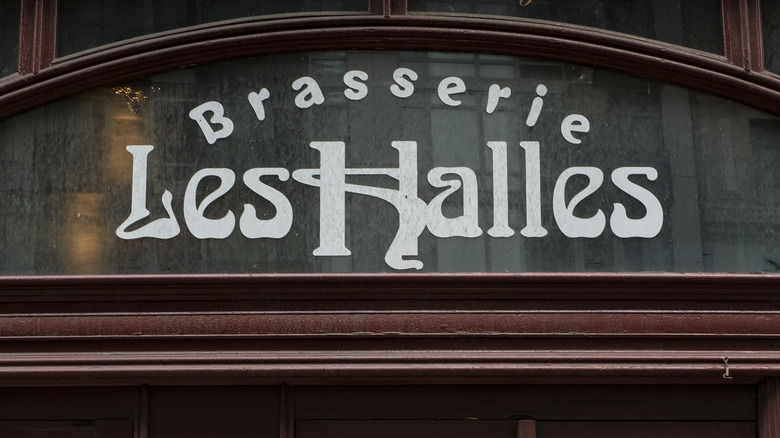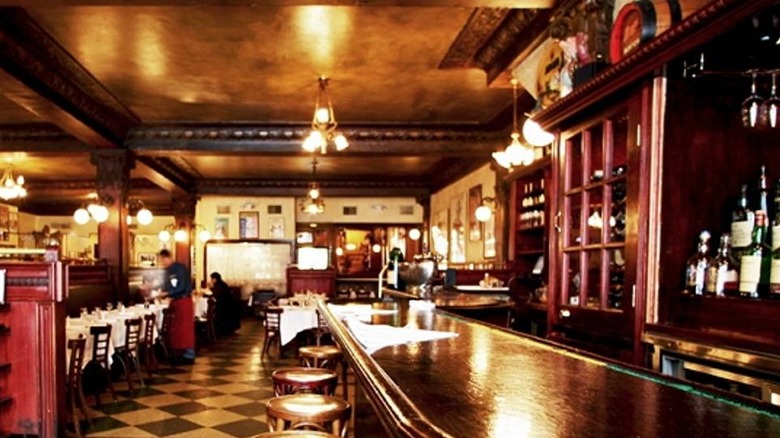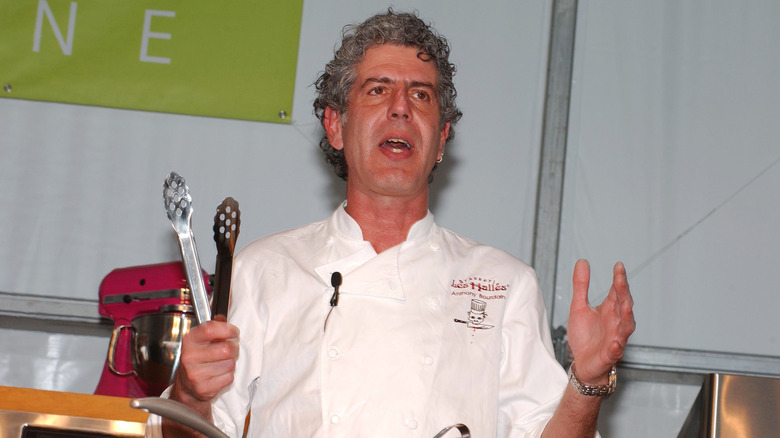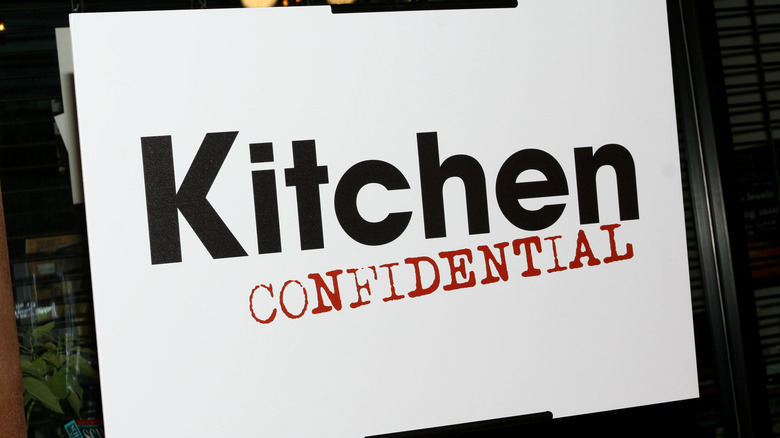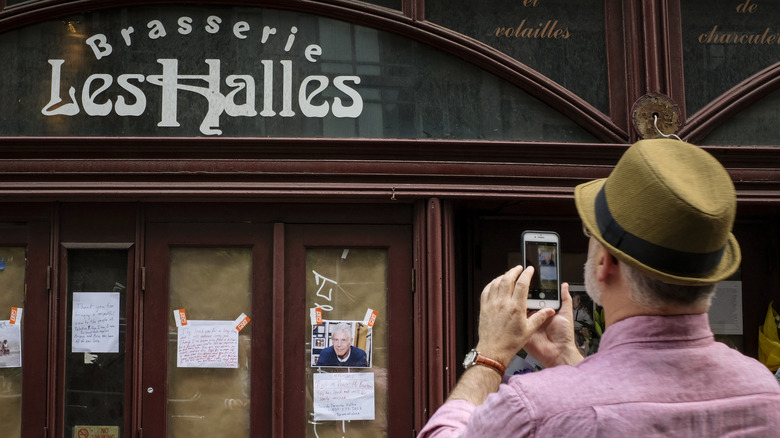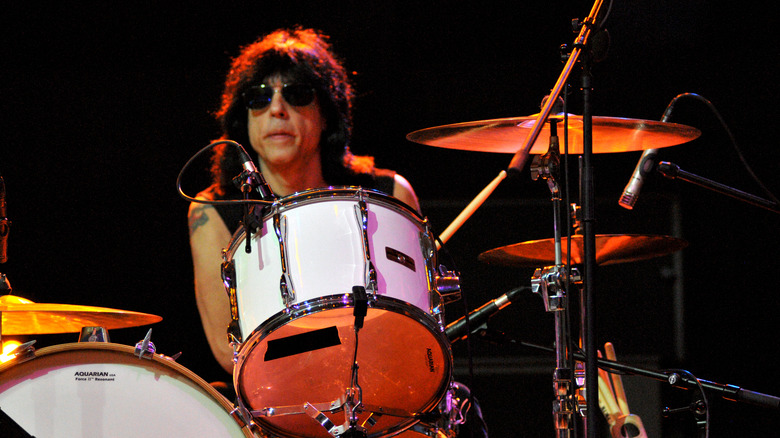The Untold Truth Of Brasserie Les Halles
On October 5, 1990, the New York Times "Diner's Journal" — the paper's regular column announcing restaurant comings and goings — ran a story about the now-long-gone Chefs Cuisiners Club, a restaurant that took New York City by storm at the time (via New York Times). At the very end, almost as an afterthought, journalist Bryan Miller tossed in a squib about a new "butcher shop and bistro" that would be opening soon on Park Avenue South. The restaurant, which would feature a small meat market in the front and a "beef-oriented bistro" in the back, was to be called "Les Halles."
Little did anyone know that this butcher shop slash bistro, which ended up being called "Brasserie Les Halles" (presumably to avoid confusion with the erstwhile, iconic Parisian fresh food market, Les Halles, which had once been nicknamed "Belly of Paris," via Flashbak), would eventually come to be one of the world's most famous restaurants. Not because it was necessarily the best of the best — as The Ringer points out, the "steak-frites joint" was nothing if not "self-consciously middle-brow" — but because it ultimately became synonymous with the late, great chef, author, and boundless personality, Anthony Bourdain, even long after he left his post as executive chef.
Read on for the untold truth of Brasserie Les Halles.
Brasserie Les Halles was the brainchild of a trio of meat-loving foodies
Brasserie Les Halles was the "creative issue" of chef Jose de Meirelles, Philippe Lajaunie, and Jean-Michel Diot (via Washington City Paper). The three had become acquainted with one another at Park Bistro, which was located across the street from Brasserie Les Halles' eventual Park Avenue South location. Merielles had been the sous-chef of Park Bistro, Lajaunie had been a waiter, and Diot had been chef. Although "the conventional wisdom of the late 1980s dictated that relatively fat-free fish and grilled chicken were what the dining public craved," Meirelles, Lajaunie, and Diot had other ideas entirely, dreaming of creating an eatery, where slabs of French-cut steak frites, and platters of charcuterie, hand-ground steak tartare, and freshly butchered organ meats would be served in all their high-fat glory, ideally to their vision of the "everyman," which in their minds was a "market worker in a bloodstained apron" looking to relax after work.
Although Brasserie Les Halles was never exactly a "working class diner," it nevertheless took off fast quickly, according to restaurant reviewer, William Grimes, writing for the New York Times in 2002, on the occasion of the opening of the second Manhattan Les Halles location. Located in Manhattan's Financial District, Les Halles Downtown was the third offshoot of the original Brasserie Les Halles. The other two were in Washington, D.C. and Miami, Florida.
Anthony Bourdain became Brasserie Les Halles' executive chef in 1998
Eight years after its opening, Brasserie Les Halles placed an ad in the local newspapers for a new head chef, according to one of the then-owners and original founders, Philippe Lajaunie (via Resy). Anthony Bourdain was one of the chefs who answered the ad and was given a shot, which consisted of an interview and an invitation to cook some dishes in the Les Halles kitchen — as a way of demonstrating his style, specialties, and whatever else he might bring to the table.
At the time, Bourdain had already run the kitchens at several famed New York City restaurants, including One Fifth Avenue (via New York Times), and one year prior, had authored an extraordinarily well-received article for The New Yorker called, "Don't Eat Before Reading This," which delivered a compelling window into the otherwise untold truth about what really goes on in the kitchens and otherwise behind the scenes of New York City's top restaurants (via The New Yorker). But the real reason Bourdain stood out was not about his cooking, but rather about his enthusiasm.
"He had the good dishes," Lajaunie explained to Resy, but probably nothing that other chefs couldn't have done. What ended up clinching it was "Tony's own enjoyment of Les Halles when he came for dinner. To me, that was the real click, on top of his cooking abilities."
Les Halles was the backdrop for Anthony Bourdain's iconic book, Kitchen Confidential
Anthony Bourdain's article, "Don't Eat Before Reading This," which appeared in The New Yorker in 1997, made such an impact on its audience that Bourdain was offered the opportunity to turn it into a full-length book (via Vox). And so he did. The book, "Kitchen Confidential: Adventures in the Culinary Underbelly," which was published in the spring of 2000, was part memoir of a youth exuberantly (and, in all fairness, rather irresponsibly) lived (via Food and Wine) and part tell-all, informed, in part, by Bourdain's experiences thus-far as executive chef of Brasserie Les Halles. "The incendiary industry tell-all was at once a colossal act of mythmaking and one of self-flagellation," according to The Ringer.
Brasserie Les Halles was so pivotal to Bourdain's "Kitchen Confidential" that Time Out called the restaurant a "character" in the book. The restaurant went on to become a New York City institution, along with Bourdain, himself. Even as Bourdain went on to become a TV star" he remained the unofficial chef-at-large for Brasserie Les Halles for the duration of the restaurant's life (it closed in 2017), even coming in on occasion to work a shift (via Page Six). Or, at least, that is how Brasserie Les Halles wished to paint it, according to Eater, which claimed in 2017 that Bourdain had not been affiliated with the restaurant for years.
Brasserie Les Halles 'seemingly' closed its doors for good in 2017
In August 2017, the last Les Halles location — the one in Manhattan's Financial District — closed its doors amid the bankruptcy of owner, Philippe Lajaunie (via Eater). Since Lajaunie had filed for a bankruptcy-related "reorganization" under Chapter 11 of the Bankruptcy Code, it was believed that it had not been his intention to close, but rather to keep Les Halles alive. However, judge saw things differently, forcing the Lajaunie to liquidate Les Halles under Chapter 7. Lajaunie was also accused of failing to pay his legal fees to his attorneys in a class action labor lawsuit that had been filed against him.
At the time, it seemed that Brasserie Les Halles' quarter-century long run was over. However, in 2018, in the wake of Anthony Bourdain's death at age 61, the original Brasserie Les Halles storefront, still standing at 411 Park Avenue South, became the unofficial memorial site for those mourning Bourdain, the restaurant's most famous chef (via Eater). Although the restaurant itself, was boarded up, its door handles were stuffed with flowers, its windows covered in notes to and photographs of Bourdain.
Then, in July 2021, coincident with the opening of "Roadrunner," the documentary about Bourdain's life, the original Park Avenue South location of Brasserie Les Halles opened as a "pop-up" for a single weekend, to honor Bourdain and his legacy, according to the Hollywood Reporter.
Les Halles was the site of the beginning of a beautiful friendship between Anthony Bourdain and this iconic rocker
Anthony Bourdain was a lifelong fan of rock and roll, or as Rolling Stone put it, a "dyed-in-the-wool punk rocker," and as he rose to fame, he got to know a number of rock and roll legends, sometimes becoming acquainted with them as he helmed the kitchen at Brasserie Les Halles. In fact, that is precisely how Bourdain became acquainted with Marky Ramone of the iconic punk rock band The Ramones, according to Rolling Stone. "I first met Tony at [Brasserie Les Halles] around 2000 or 2001," Ramone toldthe magazine. "I went there with my wife, and ... he recognized me... We started talking about music ... and he offered to make a special meal for me and my wife."
Bourdain made Ramone a "really nice steak," and for close to 20 years, the two developed a friendship, meeting at restaurants to talk about food and music. Bourdain had Ramone on "No Reservations" twice. He dedicated his book, "The Nasty Bits", to the Ramones, and he provided a press quote for Ramone's book, "Punk Rock Blitzkrieg." And it all began at Brasserie Les Halles.
